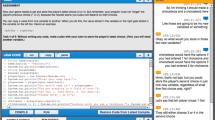Abstract
We investigate whether an overall student disengagement label and six different labels of disengagement type are predictive of learning in a spoken dialog computer tutoring corpus. Our results show first that although students’ percentage of overall disengaged turns negatively correlates with the amount they learn, the individual types of disengagement correlate differently with learning: some negatively correlate with learning, while others don’t correlate with learning at all. Second, we show that these relationships change somewhat depending on student prerequisite knowledge level. Third, we show that using multiple disengagement types to predict learning improves predictive power. Overall, our results suggest that although adapting to disengagement should improve learning, maximizing learning requires different system interventions depending on disengagement type.
Access this chapter
Tax calculation will be finalised at checkout
Purchases are for personal use only
Preview
Unable to display preview. Download preview PDF.
Similar content being viewed by others
References
Aleven, V., McLaren, B., Roll, I., Koedinger, K.: Toward tutoring help seeking: Applying cognitive modeling to meta-cognitive skills. In: Lester, J.C., Vicari, R.M., Paraguaçu, F. (eds.) ITS 2004. LNCS, vol. 3220, pp. 227–239. Springer, Heidelberg (2004)
Arroyo, I., Ferguson, K., Johns, J., Dragon, T., Merheranian, H., Fisher, D., Barto, A., Mahadevan, S., Woolf, B.: Repairing disengagement with non-invasive interventions. In: Proc. Artificial Intelligence in Education (AIED), pp. 195–202 (2007)
Baker, R.S., Corbett, A., Roll, I., Koedinger, K.: Developing a generalizable detector of when students game the system. User Modeling and User-Adapted Interaction (UMUAI) 18(3), 287–314 (2008)
Beck, J.: Engagement tracking: using response times to model student disengagement. In: Proceedings of the 12th International Conference on Artificial Intelligence in Education (AIED), Amsterdam, pp. 88–95 (2005)
Conati, C., Maclaren, H.: Empirically building and evaluating a probabilistic model of user affect. User Modeling and User-Adapted Interaction 19(3), 267–303 (2009)
Forbes-Riley, K., Litman, D.: Benefits and challenges of real-time uncertainty detection and adaptation in a spoken dialogue computer tutor. Speech Communication (2011) (in press)
Forbes-Riley, K., Litman, D.: Annotating disengagement for spoken dialogue computer tutoring. In: D’Mello, S., Calvo, R. (eds.) Affect and Learning Technologies (to appear, 2011)
Jordan, P., Hall, B., Ringenberg, M., Cui, Y., Rose, C.: Tools for authoring a dialogue agent that participates in learning studies. In: Proc. Artificial Intelligence in Education (2007)
Lehman, B., Matthews, M., D’Mello, S., Person, N.: What are you feeling? Investigating student affective states during expert human tutoring sessions. In: Woolf, B.P., Aïmeur, E., Nkambou, R., Lajoie, S. (eds.) ITS 2008. LNCS, vol. 5091, pp. 50–59. Springer, Heidelberg (2008)
Murray, R.C.: vanLehn, K.: Effects of dissuading unnecessary help requests while providing proactive help. In: Proc. of the International Conference on Artificial Intelligence in Education, pp. 887–889 (2005)
Porayska-Pomsta, K., Mavrikis, M., Pain, H.: Diagnosing and acting on student affect: the tutor’s perspective. User Modeling and User-Adapted Interaction: The Journal of Personalization Research 18, 125–173 (2008)
de Vicente, A., Pain, H.: Informing the detection of the students’ motivational state: An empirical study. In: Cerri, S.A., Gouardéres, G., Paraguaçu, F. (eds.) ITS 2002. LNCS, vol. 2363, pp. 933–943. Springer, Heidelberg (2002)
Walonoski, J., Heffernan, N.: Prevention of off-task gaming behavior in intelligent tutoring systems. In: Ikeda, M., Ashley, K.D., Chan, T.-W. (eds.) ITS 2006. LNCS, vol. 4053, pp. 722–724. Springer, Heidelberg (2006)
Author information
Authors and Affiliations
Editor information
Editors and Affiliations
Rights and permissions
Copyright information
© 2011 Springer-Verlag Berlin Heidelberg
About this paper
Cite this paper
Forbes-Riley, K., Litman, D. (2011). When Does Disengagement Correlate with Learning in Spoken Dialog Computer Tutoring?. In: Biswas, G., Bull, S., Kay, J., Mitrovic, A. (eds) Artificial Intelligence in Education. AIED 2011. Lecture Notes in Computer Science(), vol 6738. Springer, Berlin, Heidelberg. https://doi.org/10.1007/978-3-642-21869-9_13
Download citation
DOI: https://doi.org/10.1007/978-3-642-21869-9_13
Publisher Name: Springer, Berlin, Heidelberg
Print ISBN: 978-3-642-21868-2
Online ISBN: 978-3-642-21869-9
eBook Packages: Computer ScienceComputer Science (R0)




